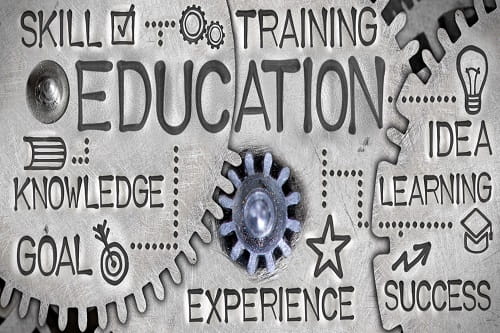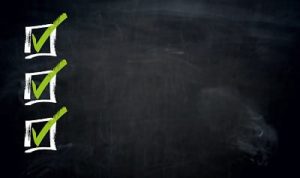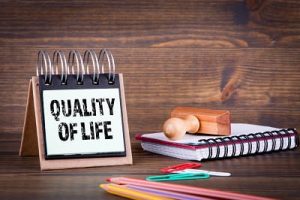Life Skills Special Education & How It Benefits Our Students

I stood and looked around my classroom at the aftermath around my Life Skills Special Education classroom. There was a handful of my hair on the ground. My hands were full of old and new scratches, fresh from that morning. I touched my stomach, where I could still feel the remnants of a bruise from being grabbed in the gut and having nails dug into my skin. My nametag was tossed onto the ground so it couldn’t be used as a weapon against me. The bookshelf on its side with everything all over floor. Supplies thrown and scattered across the room. My head already starting to hurt from having my hair pulled repeatedly.
This was a daily occurrence in my classroom. It became my norm working in a classroom at the high school level. It was second nature to wear long sleeves and my hair in a pony tail to school to minimize getting hurt. I had endured this type of behavior for years and years. It was a normal part of teaching the population I worked with. It was expected since I was a Life Skills Special Education Teacher. It was not just my norm but what everyone else also came to know of and expect of a teacher in my position. Don’t get me wrong, I loved my job and my students, but it was exhausting. Most days I would leave school feeling physically, mentally, and emotionally drained.
Naturally I spent a lot of time trying to figure out the best plan to work with this particular student. Most of the time these incidents would happen when she wanted something and the answer was no. I would not be a teacher who allowed her to have her way to avoid the behavioral eruptions. What would I be teaching her? She would start to learn that in life she can have whatever she wanted and if she threw a fit, she’d get it. Her parents even thought that way. They told me to give into her and just teach her how to write and read (she was 20 years old, soon to age out of the system and did not know her letters at all). Maybe that was acceptable at some point with previous educators she worked with but that was not okay with me.
How would I be doing my job as a teacher if I didn’t teach her how to function in her community, interact with other people, how to deal with change, how to hear the word no etc.? Working as a Life Skills Special Education teacher, I owed it to my student to do what I could to teach her life skills for her to be independent. What would be more meaningful to her and her life?
Examples of things that I want for my students to leave high school having learned:
- How to advocate for themselves
- How to ask for help if they need it
- How to deal with hearing the word “no”
- How to deal with and accept change
- What to do if your routine changes
- How to sit and eat lunch with their peers
- How to feed themselves, go through the lunch line independently
- How to be independent in the bathroom
- How to participate in class or games with their peers
- How to contact Mom or Dad via phone
- How to write an email
- How to prepare simple meals independently
- How to do their own laundry
- How to wash dishes
- How to tell time
- How to set an alarm for breaks or when work is done
- How to follow checklists for work
The Problem:
Many parents are hyper focused on academic skills and levels of math, reading etc. I am an educator; I understand how important academics are. I believe in them and I teach them daily to my students. However, we need to all get on the same page on what a life skills curriculum in special education looks like. What math and reading skills will your child need to live as independently as possible in the future? Is it better if they can multiply and divide fractions or if they can add money amounts and pay for a purchase at the store? Which skill will take your child further to be independent in their life?
That year, I was new to the school, this particular student (mentioned above) was used to getting whatever she wanted whenever she wanted for the past few years. Everyone gave into her. She got whatever she wanted all day. If someone said no, she’d become physically aggressive until they gave in. She knew what she needed to do to get her way. I was determined to do something about it. I knew it would be long, hard road ahead. Unlearning learned behaviors took time and a LOT of work and perseverance. As her life skills special education teacher, it was my job to put in the work and to teach her.
********************************************
This is a true story told to me by parents of a child I once taught.
Their son was 16 years old. He was a big kid, about 6 feet tall. Over the years, he learned how to get his way. He’d ask for something, if someone told him no, he became physically aggressive towards them, yell and scream, and jump around until he got what he wanted. One day his parents took him out to a restaurant for dinner. He had said he wanted chicken. They ordered him chicken. The waiter had said there was no more chicken. His parents tried to explain to him there was no more chicken and tried to get him to make another choice.
“Chicken!!! I want chicken!!!” The student became upset, he repeatedly went after his Mom & Dad. He hit them on the arms, in the face, wherever he could make contact. As he hit them, he continued to yell, “I want chicken!” They immediately decided to leave the restaurant.
His parents came to me that next week and told me about what had happened. They asked me to give them ideas on how we could help their child accept “no” and understand that things won’t always go their way. How could they get him to learn that sometimes the answer is no and we have to make another choice? These are the life skills that are important.
Defining a Life Skills Curriculum in Special Education
A life skills curriculum is one in which students are learning skills to enable them to live and function as independently as possible in their environment. Every student is different. Every student has their own strengths and needs. Every student will be capable of different things. It is our jobs as life skills special education teachers to figure out how to best meet the needs of our students.
********************************************
When working in a life skills special education program, you have to ask yourself…what is more important? Getting your child to read at the 3rd grade level where they may or may not be able to comprehend it OR being able to deal with change or hearing the word no? Great, they can divide fractions, but can they prepare themselves a simple snack when alone and hungry? Can they ask for help if they need it? They can calculate 573 x 34 but they can’t tell you when they need to go to the bathroom, so they have accidents.
Which of these will improve their quality of life?
Academics are very important and they are what initially drives our instruction. Life Skills are imbedded into EVERYTHING we do and teach our students. As life skills special education teachers, we will always teach both but the academics should be tweaked to address functional life skills and independence.
We also know that our students learn best in the environment they will need to use these skills. It is important to learn in their community. Initially all life skills curriculums in special education start in the classroom, but the goal is to teach students to generalize these skills into other environments. This also applies to learning job skills as well. Learning those key life skills to be independent could make the difference between a student getting competitive, paid employment vs. spending their adulthood at home.
********************************************
I know sometimes the task ahead seems daunting. It takes a lot of work and commitment from everyone. As hard as it is for us as educators, it’s just as hard for our students to unlearn years of learning and then learn new things.
Remember, life skills are embedded in EVERYTHING we do with our students.
How to start planning your life skills curriculum?
- Assess current levels of performances for your students
- Find a baseline and an attainable goal for that school year (or quarter)
- Discuss with the team (parents included) to find out what are the most important things they’d also like to focus on, or where they see their child in 5 or 10 years
- Map out how you will get them there, step by step
How to teach specific curriculum in a life skills special education classroom?
- Decide what skills can be taught as a class vs. small group vs. 1:1
- If you have assistants, take advantage! Make groups to teach and work on certain skills
- Most skills will start in class and then work on generalizing those skills into the school and then out in the community
- Which skills need to be instructed in the community? (i.e. grocery shopping) Plan community-based instruction trips for that purpose
Ideas for implementing life skills curriculum in the special education classroom:
- Role playing
- Contrived situations to teach certain skills
- Class or school store (use fake money to purchase items)
- If you have kids on a token economy or some kind of reinforcement plan, use fake dollars as what they earn for being on task. They can use that money to purchase something (reinforcements) from your classroom store.
- Doing laundry for either the PE or cooking departments at your school
- Sweeping or vacuuming the classroom after activities
- Sending a student (and adult if necessary) on an errand. Make sure they are required to say hi to people or ask them for something (delivering mail or things like that).
Many times, we take for granted things the we can already do. They come naturally to us so we don’t even think twice. But for our students, these skills do not come naturally. It is our job as life skills special education teachers to teach them these skills to help them reach their potential and be as independent as possible in their environment. Some examples are below:
- Greeting other people
- How to ask for help if we need it
- Ordering food at a restaurant
- Opening packages/containers for our lunches
- Grooming
- Executive functioning
- Problem solving & many, many more!
The examples from above are just a couple of the students I have had in my classes over the years. I have had students with a wide range of abilities and levels of functioning. Not every difficult student was one who as physically aggressive towards others. Sometimes when a student had difficulties, they would run up and down the hallway yelling or go into classrooms full of students and be disruptive.
I came across many students and situations as a life skills special education teacher. What I have learned and taken from all of that is how important it is that our students learn those core life skills. They need to learn how to be as independent as possible. We need to keep the bigger picture in mind and remember where we want to see our students in 5 or 10 years. What skills do we want them to be able to do? Do they have the ability to take care of themselves? Do a few things on their own? Will they need you for everything?
My hope is that from reading this, people are able to understand what a true life skills curriculum looks like and how it’s beneficial for our students. As educators, academics are also very important and part of everyday instruction, but it’s those life skills that will really improve our student’s quality of life and have a lasting impact on their future.



